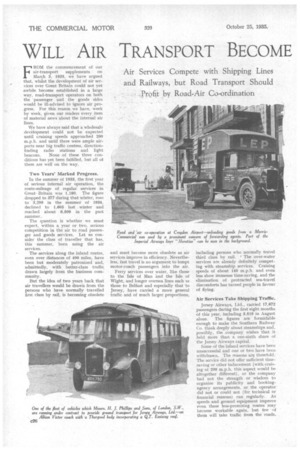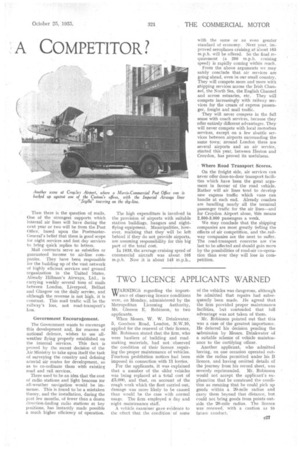WILL AIR TRANSPORT BECOME A COMPETITOR?
Page 68

Page 69

If you've noticed an error in this article please click here to report it so we can fix it.
Air Services Compete with Shipping Lines and Railways, but Road Transport Should _Profit by Road-Air Co-ordination
FROM the commencement of our air-transport supplements on March 3, 1933, we have argued that, whilst the development of air services over Great Britain could not yet awhile become established in a large way, road-transport operators on both the •passenger and the goods sides would be ill-advised to ignore air progress. For this reason we have, week by week, given our readers every item of material news about the internal air lines.
We have always said that a wholesale development could not be expected until cruising speeds approached 200 m.p.h. and until there were ample airports near big traffic centres, directionfinding radio stations and light
beacons. None of these three conditions has yet been fulfilled, but all of them are well on the way.
Two Years' Marked Progress.
In the summer of 1939, the first year of serious internal air operation, the route-mileage of regular services in Great Britain was 1,180. The figure • dropped to 377 during that winter, rose to 3,200 in the summer of 1934, declined to 1,605 last winter and reached about 6,500 in the past summer..
The question is whether we must expert, within a year or two, serious competition in the air to road passenger and goods services. Let us consider the class of traveller that has, this summer, been using the air services.
The services along the inland routes, even over distances of 400 miles, have been but moderately patronized and, admittedly, with better-class traffic drawn largely from the business community.
But the idea of two years back, that air travellers would be drawn from the persons who have normally travelled first class by rail, is becoming obsolete and must become more obsolete as air services improve in efficiency. Nevertheless, fast travel is no argument to tempt motor-coach passengers into the air.
Ferry services over water, like those to the Isle of Man and the Isle of Wight, and longer oversea lines such as those to Belfast and especially that 'to Jersey, have carried a more general traffic and of much larger proportions, including persons who normally travel third class by rail. • The over-water services are already definitely competing with steamship services. Cruising speeds of about 140 m.p.h. and even less show immense time-saving, and the elimination of protracted sea-travel discomforts has turned people in favour of flying.
Mr Services Take Shipping Traffic.
Jersey Airways, Ltd., carried 17,672 passengers during the first eight months of this year, including 5,616 in August alone. The figures are formidable enough to make the Southern Railway Co. think deeply about steamships and, possibly, the company wishes that it held more than a one-sixth share of the Jersey Airways capital. Some of the inland services have been unsuccessful and one or two have been withdrawn. The reasons are threefold. The service did not offer sufficient timesaving or other inducement (with cruising at 200 m.p.h. this aspect would be altogether different) , or the company had not the strength or wisdom to organize its publicity and bookingagency arrangements, or• the operator did not or could not (for technical or financial reasons) run regularly. As speeds and ground equipment improve even these less-promising routes may become workable again, but few -of them will take traffic from the roads.
Then there is the question of mails. One of the strongest supports which internal air lines will have during the next year or two will be from the Post Office, based upon the PostmasterGeneral's belief that there is good scope for night services and fast day services to bring quick replies to letters.
Mail contracts serve as subsidies or guaranteed income to air-line companies. They have been responsible for the building up of the vast network of highly efficient services and ground organization in the United States. Already Hillman's Airways, Ltd., is carrying weekly several tons of mails between London, Liverpool, Belfast and Glasgow on the daily service, and although the revenue is not high, it is constant. This mail traffic will be the railway's loss, not road-transport's loss.
Government Encouragement.
The Government wants to encourage this development and, for reasons of national defence, wishes to see allweather flying properly established on the internal services. This fact is proved by the recent decision of the Air Ministry to take upon itself the task of surveying the country and defining arterial air routes for development, so as to co-ordinate them with existing road and rail services.
There used to be an idea that the cost of radio stations and light beacons for all-weather navigation would be immense. This is found to be a mistaken theory, and the installation, during the past few months, of fewer than a dozen direction-finding radio stations at key positions, has instantly made possible a much higher efficiency of operation. The high expenditure is involved in the provision of airports with suitable station buildings, hangars and nightflying equipment. Municipalities, however, realizing that they will be left behind if they do not provide airports, are assuming responsibility for this big part of the total cost.
In 1933, the average cruising speed of commercial aircraft was about 105 m.p.h. Now it is about 145 m.p.h., with the same or an even greater standard of economy. -Next year, improved aeroplanes cruising at about 165 m.p.h. will be offered. So the final requirement (a 200 m.p.h. cruising speed) is rapidly coming within reach.
From the above arguments we may safely conclude that air services are going ahead, even in our small country. They will compete more and more with shipping services across the Irish Chan., nel, the North Sea, the English Channel and across estuaries, etc. They will compete increasingly with railway services for the cream of express passenger, freight and mail traffic.
They will never compete in the full sense with coach services, because they offer entirely different advantages. They will never compete with local motorbus services, except on a few shuttle services between Airports surrounding the same town; around London there are several airports and an air service, started this year, between Heston. and Croydon, has proved its usefulness.
• Where Road Transport Scores.
On the freight side, air services can never offer door-to-door transport facilities which have been the great argument in favour of the road vehicle. Rather will air lines tend to develop new express traffic which vans can handle at each end. Already coaches are handling nearly all the terminal passenger traffic for the air lines—and for Croydon Airport alone, This means 2,500-3,000 passengers a week.
We may conclude that the shipping companies are most greatly feffling the effects of air competition, and the. railway companies are the next to suffer. The road-transport concerns are the last to be affected and should gain more by the possibilities of road-air co-operation than ever they will lose in competition.
















































































































































